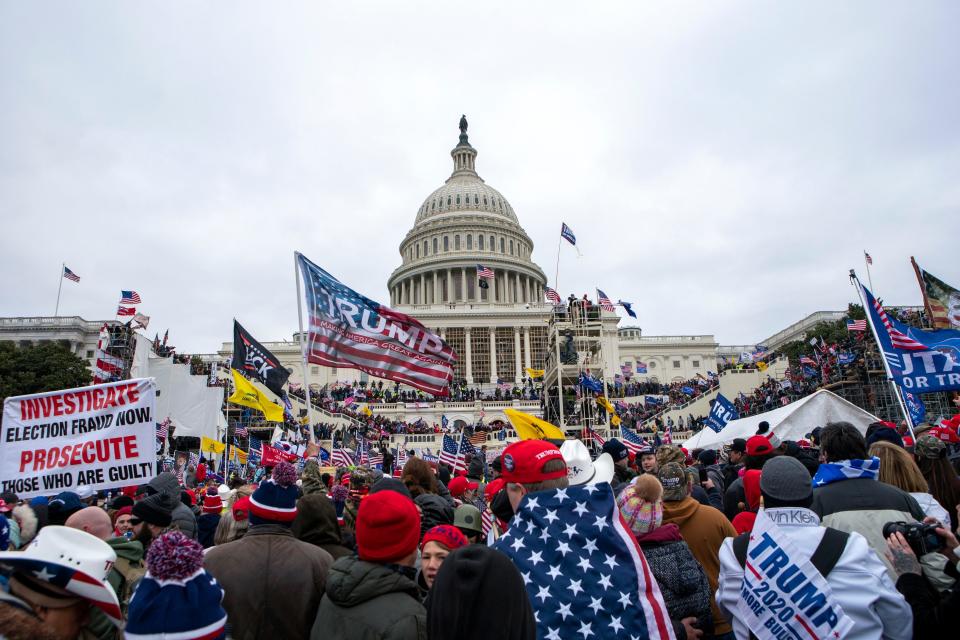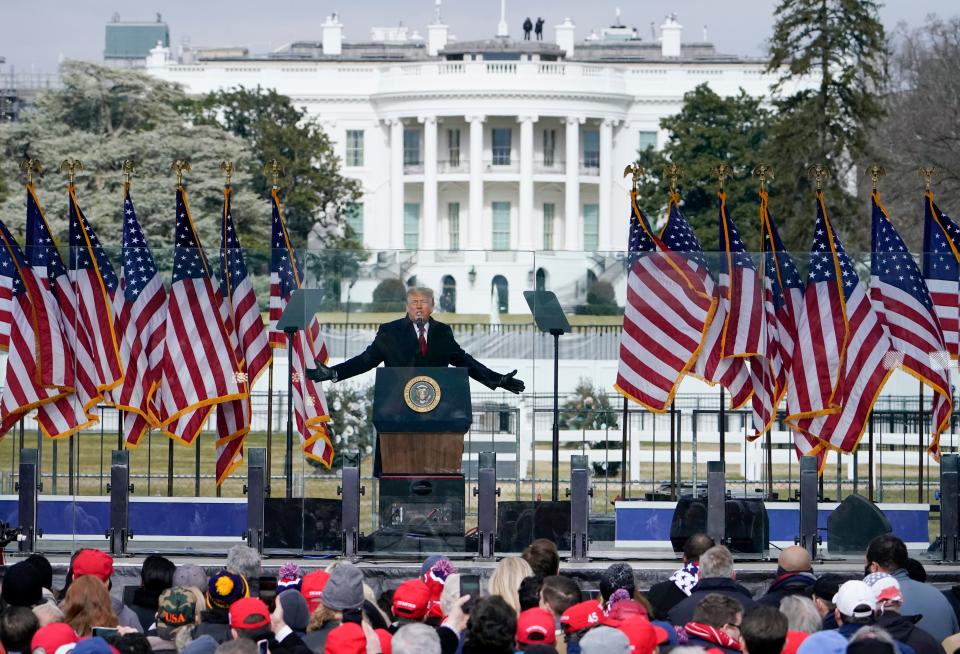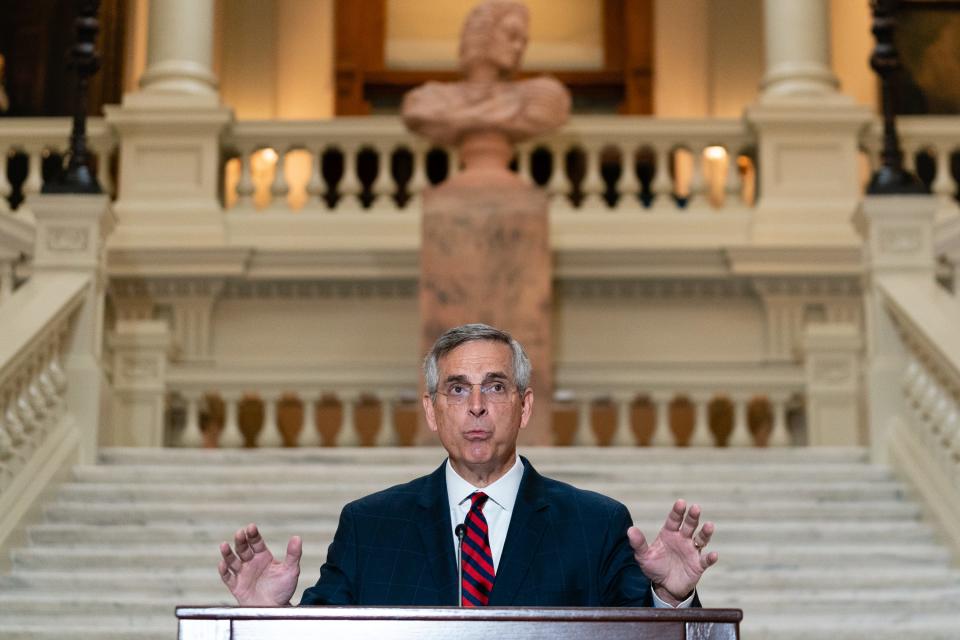‘Somewhat dicey' and ‘problematic’: Inside Trump's bid to have fake electors overturn 2020 election
Kelly Ruh, a 2020 Republican elector for then-President Donald Trump, said she was "pissed." She had scheduled a day off from her accounting job to do her political duty and help secure her state of Wisconsin for the president. But the popular vote didn't add up for him, so she didn't understand why her party insisted on dragging her to the state Capitol in an attempt to make him the winner.
“I was not expecting to prevail in the courts and was obviously pissed that I would be using a personal day off to go and complete that process,” Ruh, who was then a DePere City Council member, told congressional investigators.
Ruh was among several dozen Republican electors for Trump across the country who didn’t see themselves as criminals, as gleaned from thousands of pages of congressional testimony, hearings and court records. In many cases, the electors were state party leaders, lawyers and political activists. They unabashedly took pictures of themselves and tweeted out the results of their meetings – despite warnings from Trump campaign aides to avoid the press. Several participants groused about the futility of meeting, but acquiesced to keep Trump’s legal options open.
But the fake electors are the heart of state and federal indictments that represent the most explosive legal entanglements facing Trump for allegedly trying to steal the election.
In Georgia, Fulton County District Attorney Fani Willis indicted Trump on Aug. 14 along with three of the state's 16 fake electors: David Shafer, state Republican Party chairman; state Sen. Shawn Still and Cathy Latham, former Coffee County Republican chairwoman. Michigan Attorney General Dana Nessel announced charges on July 18 against 16 GOP electors in her state. Justice Department special counsel Jack Smith indicted Trump on Aug. 1 on three counts of conspiracy and one charge of obstruction for actions including recruiting fake electors.
What is the Electoral College?
Electors were meeting in state Capitols across the country on Dec. 14, 2020, part of a perfunctory task every four years when the Electoral College of voters confirm who won the presidency. Then-Attorney General Bill Barr called the electoral vote the end of the election.
“In my view, that was the end of the matter," said Barr, who announced the same day as the electoral voting that he was resigning. "I was not aware at that time of any theory, you know, why this could be reversed. And so I felt that the die was cast."
But within days of election, Trump’s legal advisers ginned up the strategy envisioning then-Vice President Mike Pence, in his role as Senate president, rejecting Electoral College votes from states that supported Biden and flipping them to Trump when Congress tallied the votes Jan. 6, 2021. The key for the campaign was to recruit alternate slates of electors despite restrictions in state law that one of the legal architects of the scheme called “extremely problematic” in Nevada and “somewhat dicey” in Georgia.
Trump’s campaign lost dozens of legal challenges – many before the alternates met. A federal judge called the strategy “a coup in search of a legal theory.” And the House committee that investigated the Jan. 6 attack on the Capitol labeled participants fake electors who were invalid because state officials had certified Biden’s victories and no courts had overturned them.
“They were fake,” the committee’s final report said. “They had no legal standing, and their fake votes could not have been used by Vice President Pence to disregard the real votes of electors chosen by the voters."

Trump campaign recruited alternate electors
The Trump campaign recruited alternate electors in a handful of states Biden won. Campaign lawyers and other aides from the national, regional and state levels spurred electors to meet and sign documents.
“We fought to seat electors,” said one of the electors, Meshawn Maddock, a former Michigan Republican Party co-chair and wife of state Rep. Matt Maddock, R-Milford. “The Trump campaign asked us to do that.”
Michael McDonald, the Nevada Republican chairman who became one of the alternate electors, said in a text the day after the election he was on the phone with Trump, then-White House chief of staff Mark Meadows and lawyer Rudy Giuliani.
“We’re going to have a war room meeting in about an hour in the bosses suite,” McDonald said.
Participants described the meetings as keeping Trump's legal options open in case he won his legal challenges.
“It’s like when you have the Super Bowl, you print T-shirts, both teams as being the winner, and you keep the T-shirts for the ones that were the winner and you throw away the ones that weren’t,” said Still, an alternate elector in Georgia who was the party's finance chairman at the time who is now a state senator. “As far as we knew, this was an exercise in futility and that the only ballots that were counted were the ones for Biden.”
Still was charged with racketeering, impersonating a public officer, forgery and making false statements.

Judge: The 'illegality of the plan was obvious'
Republicans in the contested states said the actions were necessary in case courts overturned the results of the election, but party leaders said they were intended to be strictly ceremonial until then.
Kenneth Chesebro, a lawyer advising Trump’s campaign, outlined the strategy in a series of memos Nov. 18, Dec. 9 and Dec. 13. Chesebro attended the Wisconsin meeting of alternate electors after using the state as a model for others to follow.
Chesebro acknowledged it might “seem odd” to vote for Trump even if he trailed in the vote count and no official certificate of election was issued. “However, a fair reading of the Federal statutes suggests that this is a reasonable course of action,” he wrote.
But in reviewing the Chesebro memos as part of a civil lawsuit, U.S. District Judge David Carter found Trump “more likely than not” corruptly attempted to obstruct Congress from counting Electoral College votes on Jan. 6, 2021.
“The illegality of the plan was obvious,” Carter wrote. “Their campaign was not confined to the ivory tower – it was a coup in search of a legal theory.”
Nessel, the Michigan attorney general, charged each of her state's electors with eight counts including election law forgery and conspiracy to commit forgery.
“The false electors’ actions undermined the public’s faith in the integrity of our elections and, we believe, also plainly violated the laws by which we administer our elections in Michigan,” Nessel said.
A Trump spokeswoman, Liz Harrington, tweeted that Democrats were "rounding up political opponents on FAKE charges."
GOP electors skeptical; one organizer sought to avoid 'team crazy'
Some state party officials voiced skepticism about the plan.
“I did not want anyone to think that we were saying we were the proper or the only proper slate of electors,” said Andrew Hitt, then-chairman of the Wisconsin Republican Party who served as one of the electors. “This was a contingency plan in case the court ruled in the Trump campaign’s favor.”
Laura Cox, then-chairwoman of the Michigan Republican Party, got COVID-19 about the time electors were supposed to meet and didn't participate. But she said Trump campaign aides called her, asking to facilitate a meeting of electors. She insisted the meeting and document were intended to be ceremonial, depending what happened in courts.
Some organizers and participants felt misled by Trump aides.
One of the Michigan electors, Michele Lundgren, who was slated to be a Trump elector if he won the race, told WDIV-TV she was “duped” by a Trump lawyer into participating in the meeting of alternate electors.
“I was an innocent little bystander in this whole thing, thinking I was doing my civic duty,” Lundgren said.
Robert Sinners, Georgia’s state director of election day operations who helped organize the meeting of alternate electors, said he wouldn't have participated if he'd known three of Trump's campaign lawyers had rejected the strategy because of the lack of court victories and had called the meeting inappropriate.
“But I know my intent was never to be aligned with team crazy,” Sinners said. “I am angry because I think in a sense, you know, no one really cared if people were potentially putting themselves in jeopardy."
Trump campaign aides spurred meetings
In Wisconsin, Hitt said Mike Roman, a senior adviser to Trump's campaign who had been a special assistant to Trump in the White House, called him Saturday morning, Dec. 12, 2020, to ask whether electors would meet two days later. Hitt said the call struck him as “disconnected” and “sort of unorganized.”
“These guys are up to no good and its gonna fail miserably,” Hitt said in a text message Dec. 12, 2020.
In Michigan, Cox said a man who said he was working with Trump’s campaign, but with no official role, told her days before the meeting electors planned to hide in the Capitol overnight to fulfill their duties.
“I told him in no uncertain terms that that was insane and inappropriate, and the Capitol was locked down because of some police issue,” Cox said.
She said the two “had words” and she eventually hung up on him. Cox then alerted then-Senate Majority Leader Mike Shirkey about the plans to stay in an unnamed senator’s office.
“He agreed with me that that was a very, very bad idea and he was going to talk to his members to make sure that nobody was planning to facilitate that idea,” Cox said. “I think cooler heads prevailed.”
In Nevada, an email exchange Dec. 10 and 11 between Chesebro and Republican National Committee member Jim DeGraffenreid, who served as an alternate elector, reinforced the meeting’s importance.
“I spoke this evening with Mayor Giuliani, who is focused on doing everything possible to ensure that all the Trump-Pence electors vote on December 14,” Chesebro wrote.

Electors' strategy prevailed despite 'futility' after lost court cases
The Trump campaign pursued the strategy despite losing numerous lawsuits challenging the election results, which were nominally the justification for alternate electors.
Six Michigan cases were rejected election challenges by Dec. 14.
Nevada Republican officials filed a lawsuit in state District Court on Nov. 17, 2020. The court dismissed the case Dec. 4 and the Nevada Supreme Court affirmed the lower court’s ruling Dec. 8.
The Wisconsin Supreme Court ruled 4-3 on morning of Dec. 14 against an election challenge, which could have still gone to the U.S. Supreme Court.
“It was very, very close,” Hitt said. If electors didn’t meet and the legal challenges were eventually successful, Hitt said “the guidance that I was given is it would be irrelevant because the elector meeting had not taken place."
Georgia Republicans sought to keep alive Trump’s options in case a court overturned narrow state results based on how absentee ballots were distributed, handled and counted. But Secretary of State Brad Raffensperger recertified the results Dec. 7 and the state Supreme Court rejected one election challenge Dec. 12, although others loomed.
“Crazy times,” Shafer, state Republican chairman and a former state senator, wrote in an email to a skeptical elector. “But in the unlikely event he wins the contest we will be screwed if we did not meet and vote.”
Shafer's lawyers filed a letter before he was indicted ? the same day Michigan’s charges were announced ? to argue that alternate electors had a right to meet and cast their votes while his lawsuit challenging election results was pending.
“Any attempt to punish our client for engaging in these protected activities would violate the United States and Georgia Constitutions, as well as unambiguous federal and state law,” the letter said.
Shafer was charged with racketeering, impersonating a public officer, forgery and making false statements.

State GOP officials promote meetings despite warning from Trump campaign aides
Sinners, who helped organize the Georgia meeting, sent an email the evening before the meeting urging potential electors to maintain “complete secrecy and discretion” and at no point “speak to media.” He said he based the warnings on the volatile political situation with political protests daily around the Capitol, and “people were open carrying firearms from both sides."
But reporters attended the meeting and quoted participants in stories. Shafer tweeted the results at 12:51 p.m., after it was over.
“Because the President’s lawsuit contesting the Georgia election is still pending, the Republican nominees for Presidential Elector met today at noon at the State Capitol today and cast their votes for President and Vice President,” Shafer said in a tweet.
“Had we not meet today and cast our votes, the President’s pending election contest would have been effectively mooted. Our action today preserves his rights under Georgia law,” Shafer said in another tweet.
Hitt in Wisconsin ignored suggestions from Trump’s campaign against alerting reporters to the meeting.
“I thought, you know, that just seemed like they are up to no good and that media certainly is going to find out about this,” Hitt said.
“We can do whatever we want,” Hitt said in a text. “We don’t answer to them.”
In Michigan, Maddock wanted to bring her lawmaker husband and a camera crew into the meeting, according to Cox. "Under no circumstances were we going to allow a camera crew in to film the ceremony because it was just a ceremony, and we believed that that was not appropriate," Cox said.
One of the Nevada electors, Shawn Meehan, said in a message Dec. 13 that McDonald, the state party chairman, was concerned about national party leaders urging them to change the location and not invite a crowd.
“He’s very concerned RNC will cut cord if it looks bad and steal credit if we do well,” Meehan said of McDonald. DeGraffenreid responded: “I know. He’s concerned that we look like foolish crybabies. Have tried to explain.”
The Nevada Republican Party tweeted out the results of the meeting with a picture of the alternate electors.
"Our brave electros standing up for what is right and casting their electoral votes for @realDonaldTrump,” said the tweet with a picture of the electors. “We believe in fair elections and will continue the fight against voter fraud in the Silver State!”
“History made today in Carson City, Nevada, as @McDonaldNV leads our electors in casting Nevada’s 6 electoral votes for the winner of Nevada, @realDonaldTrump and @Mike_Pence!” said another tweet.

Locked doors and balky printers: Inside the GOP electors' meetings
Details about the meetings are sketchy because many participants refused to testify, under their Fifth Amendment rights against self-incrimination. But some description emerged as participants and witnesses described what happened.
In Wisconsin, Republicans shuttled from party headquarters to the Capitol in SUVs, only to find the doors locked. Hitt said Heather Smith, a legislative staffer who was the girlfriend of the party’s executive director, eventually opened a door for the group of electors. Hitt said the meeting lasted about 10 minutes.
“We just got out of the vehicles and walked into the building and then took the elevator up,” Hitt said. “I don’t think everybody probably fit in one elevator. They’re fairly small there. So we waited for everybody to get up there and then we did our meeting.”
Georgia Republicans met at noon in room 216 of the Capitol, while Democrats met in the House chamber on the third floor.
Sinners, who helped organize the Georgia meeting, brought a new printer from Target to print out certificates, but spent about 20 minutes setting it up, according to Still, one of the electors.
“It just kind of became a bit of a snicker moment,” Still said.
Nevada requires the secretary of state to oversee the meeting, with electors voting only for the winner of the popular vote, which Chesebro said in a Dec. 9 memo made the state “extremely problematic.” Chesebro suggested in his memo if Congress voted to take Nevada away from Biden, the procedural detail would be overlooked.
“Therefore, perhaps arguably the Nevada electors could simply meet and cast their votes, without the involvement of the secretary of state,” Chesebro wrote.
Nevada Republicans conferred by texts and emails, questioning whether they could just meet in Carson City and not a specific building.
“We just have to meet is all required, right? In Carson City is only requirement not certain building?" Meehan asked DeGraffenreid in a text the day before the meeting. "NVSOS not being there dorks it up too.”
Michigan state law requires electors to meet on the state Senate floor at 2 p.m. Instead, Republicans met in the basement of their headquarters in Lansing near the Capitol.
One of the Michigan alternates, lawyer Mayra Rodriguez, said participants weren’t allowed to bring cellphones into the meeting, so she left hers in her car.
But the group took a picture at the end of the meeting, she said. Afterward, participants marched to the Capitol, but Rodriguez didn’t join them.
“I didn’t see a need to go,” she said.
This article originally appeared on USA TODAY: Who were 'fake' electors? Inside Trump’s bid to overturn 2020 election
